Iran general killed in drone strike ordered by Donald Trump
Pentagon says ‘decisive defensive action’ taken to prevent further US deaths
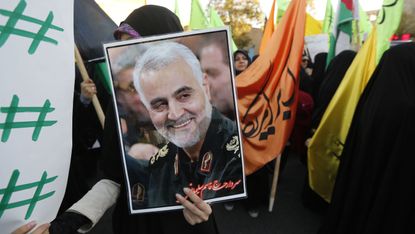
The head of the Iranian Revolutionary Guards' elite Quds Force has been killed by US forces in Iraq.
In a military attack described as “game-changing” by Fox News, General Qasem Soleimani was targeted with a drone strike while being driven from Baghdad airport by local allies.
The strike comes days after protesters attacked the US embassy in Baghdad, clashing with US forces at the scene. The Pentagon, which claims Soleimani approved the attacks on the embassy, says he was killed “at the direction of the president”.
Subscribe to The Week
Escape your echo chamber. Get the facts behind the news, plus analysis from multiple perspectives.

Sign up for The Week's Free Newsletters
From our morning news briefing to a weekly Good News Newsletter, get the best of The Week delivered directly to your inbox.
From our morning news briefing to a weekly Good News Newsletter, get the best of The Week delivered directly to your inbox.
Donald Trump ordered the airstrike as a “decisive defensive action to protect US personnel abroad” that was intended to deter “future Iranian attack plans,” the Pentagon added.
However, Iran's Foreign Minister, Javad Zarif, described the move as “an act of international terrorism” and an “extremely dangerous and a foolish escalation”.
Soleimani has led Iran's Quds Force – a unit of Iran's Revolutionary Guards – since 1998. Washington claims that the Force is “Iran's primary mechanism for cultivating and supporting” US-designated terrorist groups in the Middle East. According to CNN, Soleimani “has the blood of many Americans on his hands”.
Many consider Suleimani to have been “the second most powerful person in Iran”, behind the Supreme Leader Ayatollah Ali Khamanei, The Guardian says, and “arguably ahead of President Hassan Rouhani”.
“He was more important than the president, spoke to all factions in Iran, had a direct line to the supreme leader and was in charge of Iran’s regional policy,” explains Dina Esfandiary, a fellow at the Century Foundation think tank, in a profile. Last year, Prospect described him as a “canny, ruthless military leader” and “Iran's greatest defender”.
Therefore, attention now turns to how Tehran responds. The BBC’s chief international correspondent Lyse Doucet says: “Escalation is expected and retaliation seems certain, setting an already volatile region on an even more dangerous course.”
Mohsen Rezaei, the former commander of the Revolutionary Guards, said Iran would take “vigorous revenge on America”.
A spokesman for the Iranian government added that the nation’s top security body would meet in a few hours to discuss the "criminal act of attack".
Politicians and commentators in the US are already pointing to the Pentagon’s claim that the assassination was made to prevent further US deaths.
“One reason we don’t generally assassinate foreign political officials is the belief that such action will get more, not less, Americans killed,” Democratic Senator Chris Murphy wrote on Twitter. “That should be our real, pressing and grave worry tonight.”
–––––––––––––––––––––––––––––––For a round-up of the most important stories from around the world - and a concise, refreshing and balanced take on the week’s news agenda - try The Week magazine. Start your trial subscription today –––––––––––––––––––––––––––––––
Create an account with the same email registered to your subscription to unlock access.
Sign up for Today's Best Articles in your inbox
A free daily email with the biggest news stories of the day – and the best features from TheWeek.com
-
 Nigeria's worsening rate of maternal mortality
Nigeria's worsening rate of maternal mortalityUnder the radar Economic crisis is making hospitals unaffordable, with women increasingly not receiving the care they need
By Harriet Marsden, The Week UK Published
-
 'Elevating Earth Day into a national holiday is not radical — it's practical'
'Elevating Earth Day into a national holiday is not radical — it's practical'Instant Opinion Opinion, comment and editorials of the day
By Harold Maass, The Week US Published
-
 UAW scores historic win in South at VW plant
UAW scores historic win in South at VW plantSpeed Read Volkswagen workers in Tennessee have voted to join the United Auto Workers union
By Peter Weber, The Week US Published
-
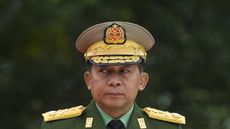 Myanmar: the Spring Revolution and the downfall of the generals
Myanmar: the Spring Revolution and the downfall of the generalsTalking Point An armed protest movement has swept across the country since the elected government of Aung San Suu Kyi was overthrown in 2021
By The Week Staff Published
-
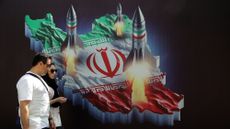 Israel hits Iran with retaliatory airstrike
Israel hits Iran with retaliatory airstrikeSpeed Read The attack comes after Iran's drone and missile barrage last weekend
By Peter Weber, The Week US Published
-
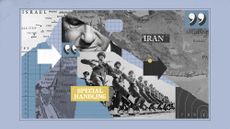 Is there a peaceful way forward for Israel and Iran?
Is there a peaceful way forward for Israel and Iran?Today's Big Question Tehran has initially sought to downplay the latest Israeli missile strike on its territory
By Sorcha Bradley, The Week UK Published
-
 How could the Supreme Court's Fischer v. US case impact the other Jan 6. trials including Trump's?
How could the Supreme Court's Fischer v. US case impact the other Jan 6. trials including Trump's?Today's Big Question A former Pennsylvania cop might hold the key to a major upheaval in how the courts treat the Capitol riot — and its alleged instigator
By Rafi Schwartz, The Week US Published
-
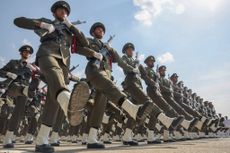 'A direct, protracted war with Israel is not something Iran is equipped to fight'
'A direct, protracted war with Israel is not something Iran is equipped to fight'Instant Opinion Opinion, comment and editorials of the day
By Harold Maass, The Week US Published
-
 'Good riddance to the televised presidential debate'
'Good riddance to the televised presidential debate'Instant Opinion Opinion, comment and editorials of the day
By Harold Maass, The Week US Published
-
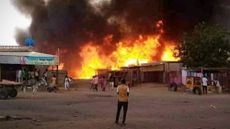 Sudan on brink of collapse after a year of war
Sudan on brink of collapse after a year of warSpeed Read 18 million people face famine as the country continues its bloody downward spiral
By Peter Weber, The Week US Published
-
 How powerful is Iran?
How powerful is Iran?Today's big question Islamic republic is facing domestic dissent and 'economic peril' but has a vast military, dangerous allies and a nuclear threat
By Harriet Marsden, The Week UK Published